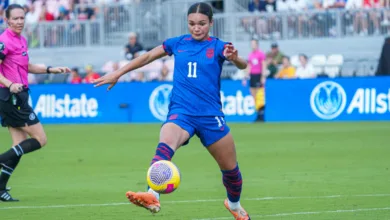Taking It to the Banks
It’s sad to pass along the news that Ernie Banks passed away last night at the age of 83. I’ve written about “Mr. Cub” quite a lot on these pages, including when he received the Presidential Medal of Freedom in 2013, and it’s incredibly hard to get across to people outside of Chicago what he meant to Cubs fans, unlike what other great players meant to their cities and fans. Being a great player is one thing. Being an Ernie Banks… well, that’s something else, and I’ll at least try to explain.
Baseball is filled with legendary players. And Ernie Banks was a Hall of Famer with statistics to stand in the same category as the best of the best. He had 512 home runs, was a 14-time All Star, still has the most base hits (2,583) and RBIs (1,636) in Chicago Cubs history (and would have the most home runs, except for being topped during the steroid era), and yet was a great defensive player, for decades having the highest fielding percentage by a shortstop during a single season.
But those are just numbers. And all the Greats have spectacular numbers. But Ernie Banks is known as Mr. Cub because for years and years, he not only put up those great numbers but did so with no other top-notch players around him. For all those years, he was pretty much the only reason to watch the Cubs.
Let me put this into perspective.
At the end of every year, when baseball analysts discuss who should win a league’s Most Valuable Player Award, the starting point of the discussion is which teams did the best, and many people argue that the winner of the MVP shouldn’t just be on one of the best teams, but on the team that actually won its division. The argument being how valuable could someone be if their team didn’t finish in first place. (The success of a team being a requirement for MVP is not an argument I agree with, but I’m in the minority on that.)
Ernie Banks won the National League MVP Award, but not with a team that finished in first place — or even close to first place (this is the Cubs, after all…) — but with a team that actually had a losing record, finishing in “second division,” the lower half of the National League.
But that’s not the point, it’s more than just that. Because Ernie Banks, in fact, won the National League MVP Award twice — with a team that also had a losing record, finishing in second division, too.
Yet even that’s not the point.
You see, only 13 players in the history of baseball have won the MVP Award two years in a row. And one of them is Ernie Banks. Who did it on teams that not only weren’t winners, but stunk. Who had losing records. He beat out future legendary Hall of Famers like Willie Mays and Hank Aaron and Roberto Clemente and Warren Spahn — who were on good teams. (Aaron and Spahn’s Braves even won the National League pennant one of those years, and finished second the other season. Mays’s Giants finished third both years.) But Ernie Banks won the National League Most Valuable Player Award two years in a row on terrible teams that had a combined record of 146-162.
That’s how great his seasons were. That’s how great Ernie Banks was. It’s easy to drive in runs when you have teammates who are getting on base ahead of you. It’s easy to get good pitches to hit when opposing pitchers know they have to pitch to you because there are good teammates batting behind you. But when you’re on really bad, losing teams and still put up amazing, Hall of Fame numbers like that, it’s remarkable.
There’s a typical sports comment about a winning team and its best player that runs along the lines of, “Without so-and-so, the team would have finished in fourth place.” One of the famous baseball quotes attributed to legendary manager Jimmie Dykes is, “Without Ernie Banks, the Chicago Cubs would have finished in Albuquerque.”
Forget how great his statistics were. That’s what Ernie Banks meant to the Chicago Cubs and their fans. Without Ernie Banks, the team would have finished in Albuquerque.
In his later years, the Cubs did finally surround Banks with some great players. But alas, the team still (as you may have heard…) still never won. And so, though Ernie Banks played for 19 years on the same team, the Chicago Cubs, he not only never won a World Series, he never made it into the post-season.
Yet he remained a sunny, joyous personality, whose most-famous quote was, “Let’s play two!”
Happily, I got to meet Ernie once, and have an autographed baseball from him. It’s sat on my desk for years. But Ernie Banks has sat in my heart much longer.
*
To read more from Robert J. Elisberg about this or many other matters both large and tidbit small, see Elisberg Industries.




